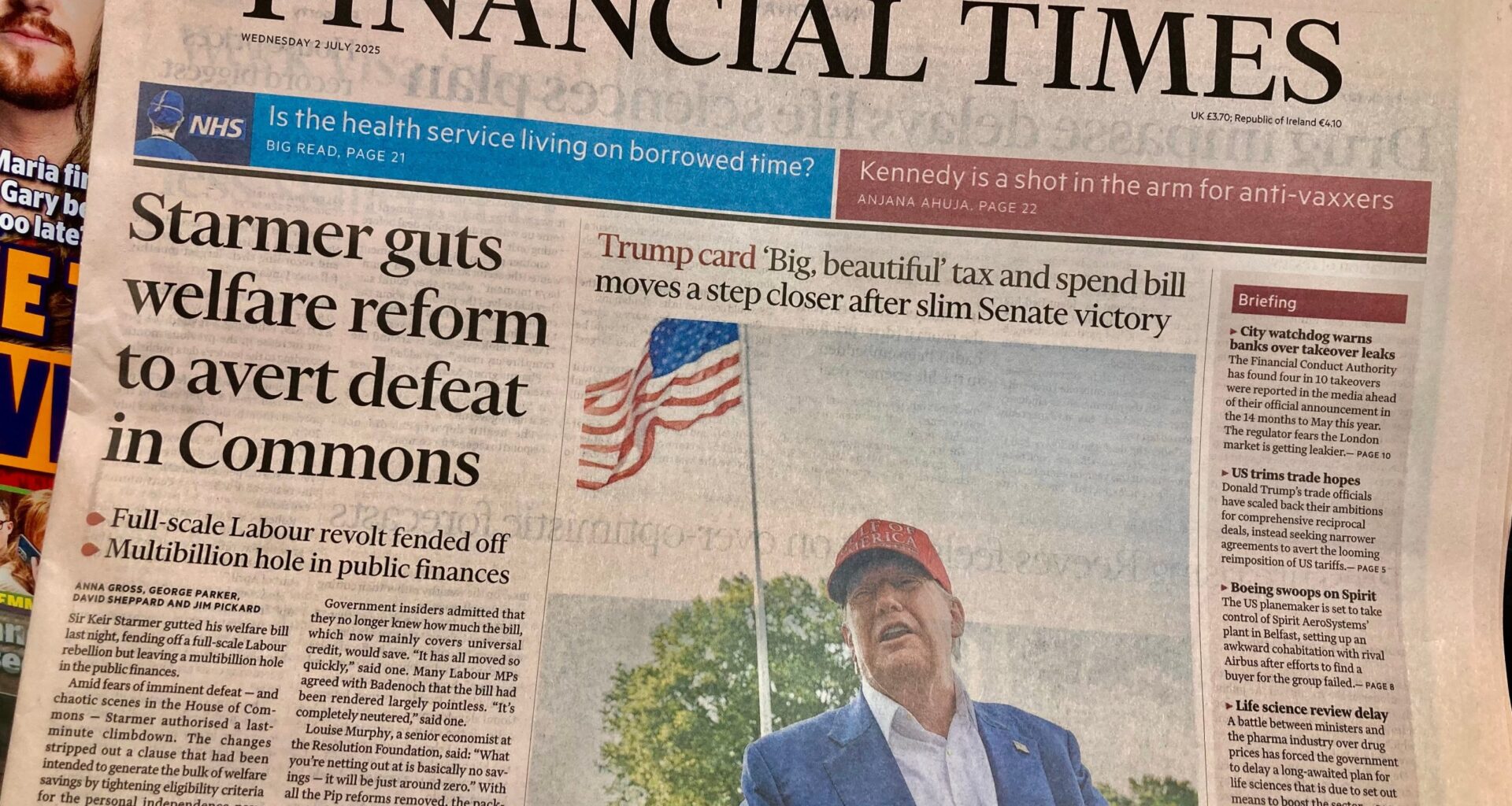The GOP’s “Big Beautiful Bill” makes deep cuts to Medicaid and SNAP, slashes taxes for billionaires and corporations, and hikes spending on the Pentagon and immigration enforcement. The package is widely expected to increase poverty, homelessness, and inequality. And it’s broadly unpopular, with over 60 percent of Americans saying they oppose it.
But the United States isn’t the only country embroiled in controversy over social policy. Across the Atlantic Ocean, surprisingly similar things are unfolding in the United Kingdom.
The notionally center-left UK government recently passed a welfare bill after its third and final reading, surviving a rebellion from dozens of Labour MPs. Prime Minister Keir Starmer’s government intends to cut welfare costs associated with its Universal Credit and Personal Independence Payment, or PIP, programs.
Universal Credits are a means-tested benefit for unemployed and low-income individuals that combine a range of benefits — including housing and income supports, among other things. Claimants can receive extra payments if a health condition or disability affects their work capacity. The new bill stipulates that from April 2026 onward, new claimants will get about £217/month, which is roughly half the current amount. The amount will not increase with inflation, meaning its real value will decrease over time.
PIPs are working-age benefits designed to cover the costs of living and working for individuals with disabilities. To attain PIP benefits, a claimant must fill out an extensive form and score above a certain point threshold. The bill restricts eligibility, making it more difficult for a person to claim the status.
Critical members of Parliament have branded the cuts “Dickensian,” arguing they will likely increase poverty and unemployment.
“I need my constituents to know that I cannot support the proposed changes to PIP as currently drafted,” said Labour MP Marie Tidball. “PIP is an in-work benefit, designed to ensure disabled people can live independently. Low-level support like PIP builds the bridge to the de-institutionalization of disabled people, keeping us out of the dark corners of hospitals, prisons, and social care settings.”
Widespread outrage has also emerged from disability rights organizations in the UK. “Labour should be ashamed of their proposed cuts, which will push disabled people into even greater poverty and destitution,” said Linda Burnip, co-founder of the organization Disabled People Against Cuts. “Disabled people will not allow themselves to be made scapegoats… while millionaires remain untouched by cuts.”
Approximately 14.3 million individuals — 21 percent of the UK’s total population — were in poverty during 2022-2023. The UK’s Department for Work and Pensions (DWP) initially estimated that roughly 250,000 additional individuals — 20 percent of whom are children — will experience poverty across the UK as a result of the bill. This number was later reduced to 150,000 after changes to the bill scaled back some of its cuts.
However, other organizations claim that the government underestimates the impact of reform. The Resolution Foundation estimates that the number could rise to at least 300,000, with 700,000 families already in poverty sinking far below the poverty line.
The U.S. is led by a far-right government and the UK is led by the center-left. But there are nonetheless similarities between their major welfare bills.
Both bills aim to cut welfare spending and tighten eligibility around health support. “Back to work” (or in the case of the UK, “right to try”) rhetoric has been routinely emphasized — and the overarching message pushed by both governments, ostensibly one of fiscal responsibility, has received pushback from social movements and organizations.
That said, the United States bill is broader and more aggressive in scope, with millions at risk of losing Medicaid and SNAP. The United Kingdom’s scope is more narrowly focused on disability benefits — and does, to some degree, emphasize transitional support and employment incentives for those impacted by the cut.
Importantly, their monetary impacts are quite different. The U.S. bill’s high-end tax cuts and runaway Pentagon spending will add trillions to the deficit. The UK bill once promised £5 billion in savings per year by 2030, but the late concessions have reduced that sum potentially to zero. Proponents would say that the bill still has some merits, claiming it encourages more people to seek employment and creates a robust, sustainable welfare system. But critics argue that the human costs of the cuts far outweigh any long-term benefits.
Despite these differences, it’s abundantly clear that social safety nets are being structurally re-designed in a way that will likely exacerbate inequality across the board, especially for those already on the margins. And they likely won’t reduce deficits, which future leaders may use as grounds for even more devastating cuts.
Policymakers, advocates, and communities should resist normalizing cuts to key social programs that ensure basic human rights. Instead, we must reimagine social policy as a tool that promotes an equitable, resilient economy that works for all.
